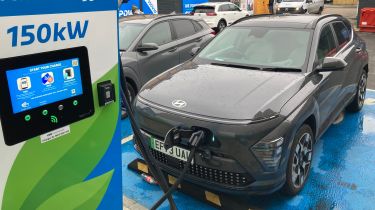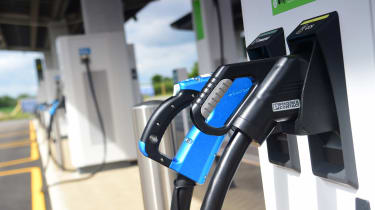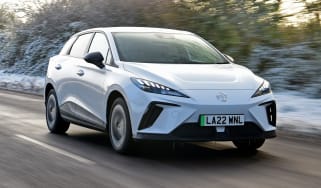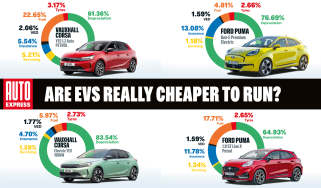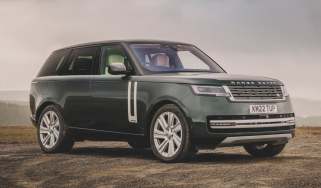Electric car charging explained: What is fast charging and what is rapid charging?
Here’s all you need to know about electric car charger types and speeds in the UK
If you’re considering buying an electric car but find yourself confused by the array of charger types available, don’t worry. While most motorists are used to the simplicity of selecting the right fuel pump and filling the tank, charging is just as easy and quickly becomes second nature for electric car owners.
In simple terms, there are slow, fast and rapid chargers available, each with different connectors. All will top up your car’s battery but each charges at a different rate.
How fast, rapid and ultra-rapid charging works
Electric vehicle batteries have to be charged with direct current (DC). When charging from an alternating current (AC) source – such as a domestic socket or public fast charger – electric vehicles and plug-in hybrids use a built-in converter to turn AC to DC.
All fast chargers typically deliver between 7kW and 22kW using AC power, and they are typically useful for charging an electric car over a few hours. Charging more slowly can be better for the long-term health of an electric car’s battery.
Fast charging at these speeds almost always needs a separate Type 2 charging cable. Most electric cars come with one of these cables as standard.
A three-pin plug for use with a standard home socket is also often standard with EVs, although sometimes it’s an optional extra. These are the slowest of all charging options.
Rapid chargers are the next step up in speed, and there are two kinds. Rapid AC charging just uses more power (up to 43kW) but is much less common, while rapid DC chargers supply direct current at between 50kW to 150kW.
These options are great for topping up during a shorter stop, perhaps while you shop or visit a service station. Rapid chargers always have their cables attached to the charging unit itself – there’s no need to plug in your own.
While 50kW DC chargers are still the most common rapid chargers in the UK, 100kW and 150kW DC chargers are becoming more prevalent – often referred to as ultra-rapid chargers.
The Tesla Supercharger network features ultra-rapid chargers of 120–150kW depending on location, while the fastest ultra-rapid chargers in the UK for now are 350kW.
Can all electric cars use these chargers?
It is important to note that peak charge speed is ultimately dictated by an electric car’s specification. According to recent data from Osprey Charging, the average peak charging rate for the 15 most common new electric cars in the UK is 118kW and there are some that can reach well beyond that. EVs are in constant development so charging speeds are only going to improve. However, older used cars can be a lot slower.
Put simply, your EV will only charge as fast as it’s designed to, even if the charger is capable of more, regardless of the potential power output of the charger it’s plugged into.
The most common connector for fast chargers is Type 2, while all rapid AC chargers use a Type 2 connection. The majority of electric cars accept these connectors due to EU legislation introduced in 2014.
DC charging is most often delivered via a CCS connector. This applies to the vast majority of electric cars but some – such as the old Nissan Leaf, and the Mistubishi Outlander PHEV models for example – use CHAdeMO for this. Pretty much all manufacturers now use the CCS connector as standard so it’s unlikely you will come across CHAdeMO on a new car. Either way, there are still many electric DC charging stations that have a connector for both methods, so with the expanding EV charging network, it's becoming ever easier to find somewhere to charge your car.
If you are unsure about your electric car’s peak charging speed and connector types, don’t forget to check the manual.
Electric car charger types
Below we look at the different types of electric car charger connectors in the UK. Increasingly, it’s Type 2 for fast charging and CCS for rapid charging but it’s possible that you could encounter the others, too.
Type 1
This is a single-phase plug with a maximum charge of 7.4kW. Type 1 is rare in the UK and more common in older imports from Japan and the US, but some cars have a Type 1 connector. Some home and public chargers have Type 1 connectors, too, but no public charging station only serves Type 1 cables: if you have a public charging cable, you should be able to charge anywhere.
Type 2
In 2014, the European Commission ruled that all public charging stations must feature a Type 2 connector or connecting capability. This is why new electric vehicles and plug-in vehicles sold in the UK feature Type 2 sockets and often come with a Type 2 cable included. Most of the home chargers that you can buy today also feature a Type 2 connector.
Type 2 connectors usually handle charge speeds of 7kW to 22kW, as well as some faster 48kW AC outputs.
CCS
CCS stands for Combined Charging System and is a rapid DC charging connector, favoured by European makers. It’s available only in public charging stations with a rapid DC charging capacity of 50kWh and above. If you want to use one, your car must have a CCS socket.
CHAdeMO
This is the Japanese counterpart of CCS. It also works on 50kW power and cars need a specific socket to use the public chargers. But, all stations with CCS also supply CHAdeMO.
Commando
Commando plugs are rare and typically found on older low-selling models or DIY charging setups. Some public charging stations do feature this connector, but they are increasingly rare.
Frequently Asked Questions
In short, yes. Networks charge different fees, but you will generally pay more for a rapid charger than a fast charger.
Now you can buy a car through our network of top dealers around the UK. Search for the latest deals…
Your electric car questions answered
- Should i buy an electric car?
- What’s the best way to buy an electric car?
- Is a hybrid, plug-in hybrid or electric car right for me?
- Should i buy a used electric car?
- Can i get a plug-in car grant?
- How is electric car range calculated?
- How much do electric cars cost to charge?
- How much do electric cars cost to run?
- How long do electric car batteries last?
- What happens to old electric car batteries?
- Should i get a heat pump on my electric car?
- Should i get a home electric car charger?
- Can i tow with an electric car?
- Is wireless electric car charging the future?
- What’s the history of the electric car?

